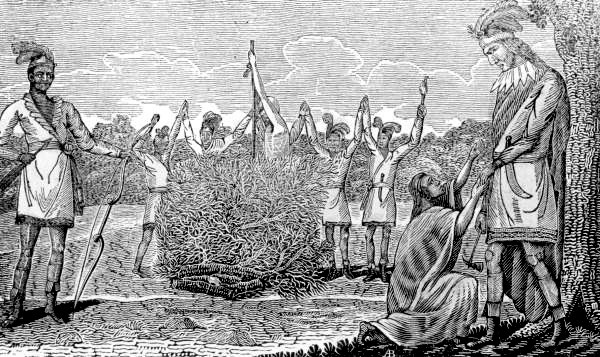It was 200 years ago this month that Andrew Jackson invaded Spanish Florida to begin what became known as the First Seminole War. The campaign was a response to increasing Indian unrest on the Georgia-Florida border, but as regular readers of these posts and our other work know, the military operation Jackson mounted had less to do with Indians and a great deal to do with wresting Florida from Spain.
Indians did figure early in the campaign, though, and at least one in an unexpected way. Lest there be confusion because of some references in our story today, which we’ve adapted from our book Old Hickory’s War, let’s take a few seconds to set the scene and introduce the dramatis personae.
Jackson's invasion followed the Apalachicola River because he was expecting the US Navy to bring his provisions for the campaign up that watercourse from the Gulf of Mexico. That was how he came to pause at a place called Prospect Bluff. It had once been the site of Negro Fort, so-called because the structure had been a haven for runaway slaves before the United States Navy blew it to smithereens on July 27, 1816. The explosion was so spectacular that people some 200 miles away in Pensacola heard it. Prospect Bluff is where our story begins.
The cast should be clear except for one of the Creek Indians. Sometimes these Indians had names derived from intermarriage with Euro-Americans, and the result was that their monikers were so un-Indian that it's hard to tell whose side they belonged to and why they were fighting Andrew Jackson. In this instance, one character was known to Creeks and whites as both “Hillis Hadjo” and “Josiah Francis.” Francis is sometimes misidentified as a Red Stick ”chief," but he held a much more exalted position than that. Josiah Francis was a prophet whose powers of sight were presumed to be supernatural and whose influence was so significant that the British deemed him a potentially valuable ally. After the War of 1812, he visited England where he was entertained by members of Parliament and met the Prince Regent, the future King George IV. Josiah Francis had only recently returned to Florida from this fantastic journey when the events in our story take place.
Let us raise the curtain then on the American army at Prospect Bluff. Nearby something extraordinary is about to happen.
On March 16, 1818, the army arrived at what had been Negro Fort. Charred remains and scattered debris still bore witness to the explosion in 1816. Jackson had to give grudging admiration to the British who had first chosen the site. It was by far the best location he had seen for a fort on the river. Liking the site and the terrain around it, Jackson decided to build a fortified supply depot there He, instructed his aide, Lieutenant James Gadsden, to draw up the plans. Young Gadsden had a flair for the work, and Jackson found it so agreeable that he christened the new structure Fort Gadsden.
While some worked to build the fort, others turned the wait into something of a holiday. Regulars, Georgia militia, and Allied Creeks spent their days constructing Fort Gadsden, but the Tennesseans who accompanied Jackson with the air of a Praetorian Guard roamed the camp making mischief. Some suspects Jackson favored the Tennesseans with light duties because he held them in higher esteem than the Georgians. Probably more important was the old political habit of catering to the militia of one’s state to secure a loyal political constituency.
In any event, Jackson did not like Georgians. One day while everyone else worked, a few rollicking Tennesseans undertook to bathe a Georgia militiaman by throwing him in the Apalachicola. Jackson watched with amusement until Georgian Thomas Woodward intervened to stop the dunking. Woodward, part Indian himself, commanded some of the Indian troops accompanying the campaign, and he was sufficiently menacing to make these boys know he had seen enough Tennessee antics for one day. An uncomfortable stand-off finally ended with the release of the Georgian, but Jackson stood scowling. Finally he stalked away, cursing Woodward as an “Indian looking son-of-a-bitch.”
During the army’s pause at Prospect Bluff, another Georgian fell into a far more serious predicament than roughhousing by some Tennessee rowdies. Sergeant Duncan McKrimmon of the Second Regiment of Georgia militia misread the uneventful nature of the campaign to believe the woods away from Fort Gadsden held no perils. With fishing rod in hand, he slipped away for a pleasant day far from the hammering, sawing, lifting, and carrying. The water was restful and the pastime soothing. McKrimmon probably never saw them until they were on him.
They were Red Stick Creeks, patrolling the area. To McKrimmon’s good fortune, they were more interested in what he knew than anything else. That at least kept him alive and relatively untouched as the Indians dragged him to Josiah Francis’s town on the Wakulla River. He told them everything he knew about Jackson’s plans, but it could not have been much more than they already suspected, so poor McKrimmon quickly exhausted his usefulness. His captors stripped him naked, blackened his face, and tied him to a tree. They began dancing as a preparatory ritual for his torture and execution.
Not far away, on the banks of the Wakulla, two teenaged girls heard the commotion and came running to see its cause. They were sisters, the daughters of the prophet Francis, the older named Milly. She was only sixteen but already, it was said, a great beauty who took girlish pleasure in wearing the odd but fine garments her father had brought from England. Arriving in the square, she saw the dancing warriors circling McKrimmon and instantly realized what was about to happen. She ran to her father to beg his intervention, but he reminded her that tradition prohibited his interference in such matters. Only the men who had captured McKrimmon had the right to kill or spare him. Francis at least told Milly he would not stop her from talking to the warriors.
When she did, they stopped their dancing while one exploded into an enraged explanation of why McKrimmon had to die. Whites had killed two of his sisters, he shouted. Milly said that killing the young white boy would not bring back the sisters. She persisted. Gradually, the anger drained away from the scene to leave the warriors stopped in their tracks, no more to dance, and finally to cut down McKrimmon. Soon, at St. Marks, they ransomed him to Spaniards for seven and a half gallons of rum, no doubt thinking they had gotten the better of the bargain

Milly entreats her father
After the war, after Milly and her sister and mother had lost everything, including her father, they surrendered to the army at Fort Gadsden. Duncan McKrimmon heard about this and traveled from his home in Milledgeville to Prospect Bluff, where months before he had gone fishing, almost for the last time. He found the Francis women destitute, so he was happy to bring Milly a modest gift of money from the citizens of Milledgeville, a remembrance for her gallant, graceful intercession on his behalf. Duncan McKrimmon also asked Milly Francis to marry him. She gratefully took the money but gently refused him.
“I did not save you for that,” she said, and indeed she had not done it for any reward. Neither for marriage nor money had Milly Francis saved the terrified white boy that spring afternoon on the banks of the Wakulla. She had just done it.
In the years after the First Seminole War, many Indians in Florida, confronting the specter of starvation, chose capitulation and removal as their only option. Milly Francis was among those who migrated west shortly after the war. In 1842, an army major named Ethan Allen Hitchcock found her in Arkansas, impoverished and wearing little of the great beauty of her youth. Her forty-some-odd years had relentlessly eroded it. She had not married McKrimmon, but she had married, though by the time Hitchcock met Milly, her husband was dead, as were five of her eight children. Hitchcock listened to her story about saving Duncan McKrimmon, though he knew it already. Indeed, he had searched out the famous Red Stick “Pocahontas” to hear firsthand about her inspiring act of kindness.
Listening to the story from her lips made Major Hitchcock sad, though. In fact, his meeting with Milly left him deeply affected. He began lobbying the government to grant her a pension. His two-year effort finally persuaded Congress to appropriate for her a $96 annuity and to authorize a medal commemorating her rescue of Duncan McKrimmon. True to the torpid habits of bureaucracies everywhere, the United States government took another four years to send the first installment of the pension. By then, Milly Francis was dying.
It did not matter that the money was late. For Milly the war had become an ever dimmer memory, its victims fading martyrs, its victors fading foes. Her father had been in his grave thirty years, Andrew Jackson in his three, and Milly was not sorry to be slipping away to hers.
Her father had always claimed he could fly like a soaring bird. Milly in the twilight probably knew that she would not need money or medals to do so herself. She would just close her eyes.



